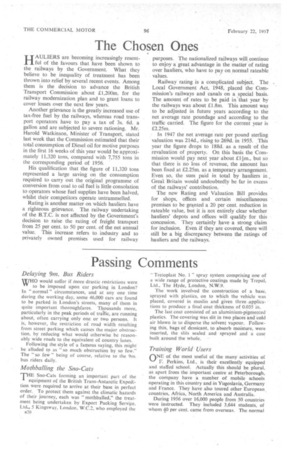The Chosen Ones
Page 24

If you've noticed an error in this article please click here to report it so we can fix it.
▪ AULIERS are becoming increasingly resent ▪ ful of the favours that have been shown to the railways by the Government. What they believe to be inequality of treatment has been thrown into relief by several recent events. Among them is the decision to advance the British Transport Commission about £1,200m. for the railway modernization plan and to grant loans to cover losses over the next few years.
Another grievance is the greatly increased use of tax-free fuel by the railways, whereas road transport operators have to pay a tax of 3s. 6d. a gallon and are subjected to severe rationing. Mr. Harold Watkinson, Minister of Transport, stated last week that the Commission estimated that their total consumption of Diesel oil for motive purposes in the first 16 weeks of this year would be approximately 11,320 tons, compared with 7,755 tons in the corresponding period of 1956.
His qualification that the figure of 11,320 tons represented a large saving on the consumption required to carry out the original programme of conversion from coal to oil fuel is little consolation to operators whose fuel supplies have been halved, whilst their competitors operate untrammelled.
Rating is another matter on which hauliers have a righteous grievance. The railway undertaking of the B.T.C. is not affected by the Government's decision to raise the rating of freight transport from 25 per cent. to 50 per cent. of the net annual value. This increase refers to industry and to privately owned premises used for railway purposes. The nationalized railways will continue to enjoy a great advantage in the matter of rating over hauliers, who have to pay on normal rateable values.
Railway rating is a complicated subject. The Local Government Act, 1948, placed the Commission's railways and canals on a special basis. The amount of rates to be paid in 'that year by the railways was about £1.8m. This amount was to be adjusted in future years according to the net average rate poundage and according to the traffic carried. The figure for the current year is £2.25m.
In 1947 the net average rate per pound sterling valuation was 214d., rising to 269d. in 1955. This year the figure drops to 188d. as a result of the revaluation of property. On this basis the Commission would pay next year about film., but so that there is no loss of revenue, the amount has been fixed at £2.25m. as a temporary arrangement. Even so, the sum paid in total by hauliers in Greal Britain would undoubtedly be far in excess of the railways' contribution.
The new Rating and Valuation Bill provides for shops, offices and certain miscellaneous premises to be granted a 20 per cent. reduction in rateable value, but it is not entirely clear whether hauliers' depots and offices will qualify for this concession. They certainly have a strong claim for inclusion. Even if they are covered, there will still be a big discrepancy between the ratings of hauliers and the railways.
























































































